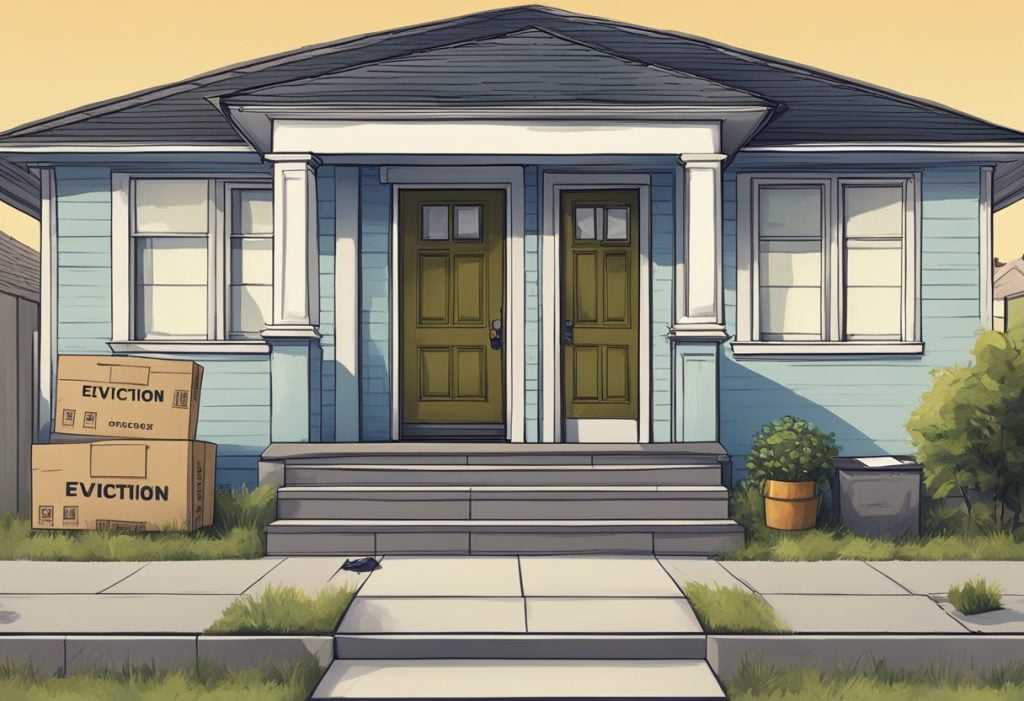Last Updated on March 18, 2024 by Kelvin Nielsen
If you’re a landlord or a tenant in Florida, you may be wondering how long the eviction process takes. The answer is that it depends on several factors, such as the reason for the eviction, how quickly the court schedules the hearing, and whether the tenant contests the eviction.
Generally, the eviction process in Florida can be completed in two to three weeks, but it can take longer in some cases.

Under Florida law, a landlord can’t legally evict a tenant without cause. The most common reasons for eviction include failure to pay rent, violating the lease agreement, and causing damage to the property.
The landlord must provide the tenant with a written notice of the eviction and the reason for it. The notice must comply with the requirements of Florida law, including the length of notice required and the method of delivery.
If the tenant contests the eviction, the court will schedule a hearing. The hearing may take several weeks to be scheduled, depending on the court’s schedule. At the hearing, both the landlord and the tenant will have an opportunity to present their case, and the judge will make a decision based on the evidence presented.
If the judge rules in favor of the landlord, the tenant will have a certain amount of time to vacate the property. If the tenant fails to vacate, the landlord can obtain a writ of possession and have the sheriff remove the tenant from the property.
Related Posts:
- What Happens When a Tenant Dies in Florida?
- When Does a Guest Become a Tenant in Florida?
- Legal Reasons to Break a Lease in Florida
Understanding the Florida Eviction Process
If you are a landlord in Florida and you need to evict a tenant, it is important to understand the legal process and follow the proper procedures. Here is what you need to know about the eviction process in Florida.
Legal Grounds for Eviction
In Florida, a landlord can evict a tenant for a variety of reasons, including non-payment of rent, violating the terms of the lease, and committing criminal acts on the rental property. Florida Statute 83 outlines the specific grounds for eviction.
The Eviction Timeline
The eviction process in Florida can take anywhere from two to six weeks, depending on the reason for the eviction and whether the tenant contests it. The process typically involves serving the tenant with a notice to vacate, filing an eviction lawsuit, and attending a court hearing.
If the judge rules in favor of the landlord, a writ of possession will be issued, and the sheriff will remove the tenant from the property.
Types of Notices
There are three types of notices that a landlord can serve a tenant in Florida: a three-day notice to pay rent or quit, a seven-day notice to comply or quit, and a seven-day unconditional quit notice.
The notice must be served in writing and must contain specific information, such as the amount of rent owed and the reason for the notice.
Related Posts:
After the Eviction

Tenant Rights and Property Handling
Once the eviction process is complete and the tenant has been removed from the property, they have a limited amount of time to retrieve their belongings. The landlord must provide the tenant with a notice detailing where the items are being held and how to retrieve them. If the tenant fails to retrieve their belongings within the specified time frame, the landlord may dispose of them.
In the event that the tenant left behind personal property that is of value, the landlord must hold onto it for a period of time before disposing of it. The amount of time varies depending on the value of the property. If the tenant fails to claim the property within the specified time frame, the landlord may sell it and use the proceeds to cover any outstanding rent or damages.
Legal Consequences and Recovery
If the tenant was evicted due to non-payment of rent, the landlord may be entitled to monetary damages. The landlord can file a judgment against the tenant in court to recover any unpaid rent, as well as any damages to the property. The tenant may also be responsible for attorney fees and court costs.
If the tenant violated the terms of the rental agreement or lease term, the landlord may be entitled to monetary damages as well. The landlord can file a complaint with the court to recover any damages to the property or unpaid rent. The tenant may also be responsible for attorney fees and court costs.
It is important to note that evicting a tenant can be a complex process that requires following specific legal procedures. It is highly recommended to seek legal assistance to ensure that the eviction is carried out in compliance with Florida eviction laws.
Frequently Asked Questions
What are the legal grounds for eviction in Florida?
A landlord can legally evict a tenant in Florida for several reasons, including non-payment of rent, violating terms of the lease, causing damage to the property, or engaging in illegal activities on the premises.
What is the typical timeframe for a 3-day eviction notice to lead to an eviction?
The typical timeframe for a 3-day eviction notice to lead to an eviction in Florida is approximately 30 days. However, the exact timeframe can vary depending on the reason for the eviction and whether the tenant contests it.
What steps must a landlord take to legally evict a tenant in Florida?
To legally evict a tenant in Florida, a landlord must provide proper notice, file an eviction lawsuit, attend a court hearing, and obtain a judgment of possession. If the tenant does not vacate the premises voluntarily, the landlord must obtain a writ of possession and have it executed by the sheriff.
How long does a tenant legally have to vacate after an eviction judgement in Florida?
After an eviction judgment is obtained in Florida, a tenant typically has 24 hours to vacate the premises. If the tenant does not vacate voluntarily, the landlord can obtain a writ of possession and have it executed by the sheriff.
Can a tenant legally stop or delay an eviction once a writ of possession is issued in Florida?
Once a writ of possession is issued in Florida, a tenant can only stop or delay the eviction by filing an appeal or requesting a stay of execution. However, these options are only available in limited circumstances and may not be successful.
Under what circumstances can a tenant be evicted without the standard notice period in Florida?
A tenant can be evicted without the standard notice period in Florida if they engage in certain illegal activities on the premises, such as drug use or violence. In these cases, the landlord can obtain an immediate writ of possession and have it executed by the sheriff.
Disclosure: The content herein isn’t a substitute for advice from a professional attorney. It’s only meant to serve educational purposes. If you have a specific question, kindly seek expert attorney services.
Sources: FL Statutes Chapter 83 Part II, Florida Renters Rights Guide

Amanda Rose is a seasoned landlord with 13+ years of expertise in overseeing diverse properties. Her adept management spans single and family homes, along with multi-family apartments and condos, across Wyoming and South Dakota. Her commitment and proficiency have cemented her status as a thriving property management professional.
She is a member of the following organizations: Wyoming Landlord’s Association, National Association of Residential Property Managers (NARPM), Wyoming Apartment Association, South Dakota Multi-Housing Association (SDMHA), and South Dakota Landlord Association (SDLA).







